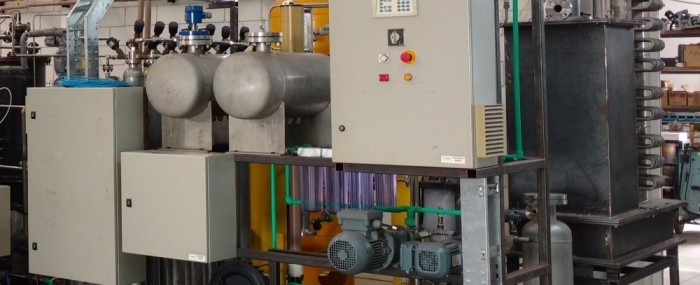

With FAPESP’s support, Hytron has developed a containerized solution for hydrogen production via ethanol reforming that eliminates the need for shipping by tanker trucks. The equipment can supply the gas to factories and vehicle service stations (photo: Hytron)
With FAPESP’s support, Hytron has developed a containerized solution for hydrogen production via ethanol reforming that eliminates the need for shipping by tanker trucks. The equipment can supply the gas to factories and vehicle service stations.
With FAPESP’s support, Hytron has developed a containerized solution for hydrogen production via ethanol reforming that eliminates the need for shipping by tanker trucks. The equipment can supply the gas to factories and vehicle service stations.

With FAPESP’s support, Hytron has developed a containerized solution for hydrogen production via ethanol reforming that eliminates the need for shipping by tanker trucks. The equipment can supply the gas to factories and vehicle service stations (photo: Hytron)
By Eduardo Geraque | FAPESP Innovative R&D – In 2003, five graduate students at the University of Campinas (UNICAMP) in the state of São Paulo, Brazil, set up a company to convert their research at UNICAMP’s Hydrogen Laboratory into a product. Their long-term aim was to offer technological solutions involving the supply of hydrogen (H2) for industrial use and as an automotive fuel.
“The lab was then more than 30 years old and had accumulated a great deal of knowledge. We invested in the production of gaseous hydrogen for industrial use, vehicle fuel cells, stationary power sources, distributed generation and energy storage,” Daniel Gabriel Lopes told FAPESP Innovative R&D.
Lopes has a degree in mechanical engineering. After graduating, he moved to the interior of São Paulo from his home town in Ceará State some 3,000 km away and founded Hytron with two colleagues he met while they were all graduate students at UNICAMP. Hytron is a pioneering innovator in Brazilian engineering and integration solutions for energy and gas systems, focusing on hydrogen.
With funding from FAPESP for a project supported by the Innovative Research in Small Business Program (PIPE), the startup developed a container-mounted system that produces hydrogen from ethanol.
The equipment has several applications. It is used in the food industry to produce hydrogenated fat, for example. Other applications include semiconductor production, metallurgy, and glassmaking. “Hydrogen is typically delivered by tanker truck. Our equipment does away with the need for this method of delivery,” Lopes said.
The hydrogen-producing containers can also be used to refuel vehicles directly at service stations if demand for this type of vehicle grows sufficiently in Brazil. “We produce hydrogen in a modular and efficient manner, offering a product with suitable purity for industrial and automotive applications,” Lopes said.
Besides hydrogen production from ethanol (a route technically known as ethanol reforming), developed with FAPESP’s support, Hytron also produces H2 from methane, biomethane, and water (via electrolysis). This versatility is required to meet demand and use the feedstocks available close to its customers.
“Our intent has always been to supply technologies for the hydrogen market, and to use ethanol as one of the inputs,” Lopes said.
Internationalization
In contrast with the situation in Brazil for several reasons, hydrogen for automotive fuel cells is widely available in Europe, the United States, and Japan. The firm’s business plan has therefore always included internationalization, Lopes noted, in order to take advantage of actual market demand rather than waiting for opportunities to emerge in Brazil.
To drive further growth in global use of hydrogen, at end-2020 the firm agreed to be taken over by Neuman & Esser (NEA), based in Aachen, Germany. NEA is a world leader in compressor solutions, including piston and diaphragm compressors.
“We remain a Brazilian firm that creates innovation in Brazil and exports to other countries,” Lopes said. “We’ll still be supplying technology for hydrogen production but now we can also offer complete solutions. Also, we won’t be focusing on only one production technology. It’s possible to make hydrogen from ethanol, natural gas, biomethane, or water.”
One of the technological gains obtained by the firm, which operates out of Sumaré in metropolitan Campinas, is scale. In Brazil, 98% of hydrogen production is from natural gas and centralized by large refineries, so altering this route was a challenge. “We’ve succeeded in making distributed generation feasible by producing hydrogen directly where it’s consumed,” Lopes said. “This eliminates the need for shipping from refineries.”
Despite all the technological improvements implemented since 2003, however, there are still barriers and bottlenecks to be addressed in hydrogen production from ethanol. The next challenge, Lopes said, relates to financing for the acquisition of equipment by customers so as to reduce operating costs. “One of the frontiers to be crossed now is low-cost hydrogen production via ethanol reforming, as well as demonstrating its various industrial applications.”
Being based in the Campinas region is fundamental for innovation to proceed. “We can make practically any component we need within a radius of 50 km,” he said. “When that’s not possible, it’s unlikely that the item can be produced in Brazil.”
Republish
The Agency FAPESP licenses news via Creative Commons (CC-BY-NC-ND) so that they can be republished free of charge and in a simple way by other digital or printed vehicles. Agência FAPESP must be credited as the source of the content being republished and the name of the reporter (if any) must be attributed. Using the HMTL button below allows compliance with these rules, detailed in Digital Republishing Policy FAPESP.





